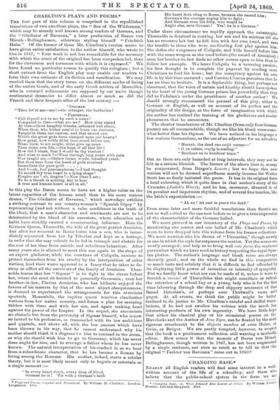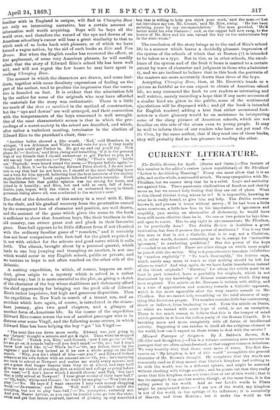CHANGING BASE.*
NEARLY all English readers will find some interest in a wellwritten account of the life of a schoolboy, and those who believe that the public-school system in the form we are familiar with in England is unique, will find in Changing Base not only an interesting narrative, but a certain amount of information well worth acquiring. Boys will be boys all the world over, and therefore the record of the ups and downs of an American schoolboy's career will bear a great similarity to that to which each of us looks back with pleasure, or of which we have formed a vague notion, by the aid of such books as Eric and Tom Brown. But when the English reader has recovered the effect, at first unpleasant, of some very American phrases, he will readily admit that the story of Edward Rice's school life has been well told, and will not regret the few hours he may have spent in reading Changing Base.
The manner in which the characters are drawn, and some incidents, together with some desultory expressions of feeling on the part of the author, tend to produce the impression that the narrative is founded on fact. It is evident that the admiration felt by the author for some of the originals who may have afforded the materials for the story was enthusiastic. There is a little too much of the dens ex machinii in the method of construction, but the "ups and downs" are well arranged, and their connection with the temperaments of the boys concerned is well wrought. One of the most characteristic scenes is that in which the proceedings of a secret society in the school are described, and which, after rather a turbulent meeting, terminates in the election of Edward Rice to the president's chair, thus :—
"Another ballot showed a like result. 'Ned,' said Honshaw, in a whisper, see Atkinson and White would vote for you, if they really thought you could get Parker in. Do get up and say you'll try. Now please do.'—'Archon,' said Rice, rising and trembling, 'if it is the general wish of my friends that I should endeavour to got Parker to.join us, I will use my best exertions.'—' Bravo," Bully," That's right," Little ass," Popcock,' were heard round the room.—' Prepare ballots again.'— ' Smith, 5; Rice, 9.'—'In declaring Edward Price elected, I do not hesitate to say that had he not been so. I should at the next balloting have cast a vote for him myself, believing that the best interests of the society require his election.' Loud applause followed Carter's remarks. Even the Smithites felt that public opinion was too strong for them, and joined in it heartily ; and Rice, hot and cold at once, full of fears, doubts, joys, hopes, with the vision of an unlearned lesson in Greek grammar rising above all, was conducted to the archon's scat."
The effect of the detection of this society in a revel with E. Rice in the chair, and his gradual recovery from the prostration caused by the consequent loss of character and position, are well drawn, and the account of the game which gives the name to the book is sufficient to show that American boys, like their brethren in the old country, can evince great zeal and pluck in their favourite game. Base ball appears to be little different from if not identical with the ordinary familiar game of "rounders," and it certainly does not bear comparison with foot-ball for the pluck required in it, nor with cricket for the science and good nerve which it calls forth. The climax, brought about by a personal quarrel, which leads to one boy jumping and trampling on another, is not one which would occur in any English school, public or private, and we venture to hope is not often reached on the other side of the Atlantic.
A nutting expedition, in which, of course, happens an accident, gives origin to a mystery which is solved in a rather tragical way ; but it is more essential to the plot, as giving a sketch of the character of the boy whose shabbiness and dishonesty afford the chief opportunity for bringing out the good side of Edward Rice's rather impulsive, but high and generous disposition. Then the expedition to New York in search of a truant son, and an accident which here again, of course, is introduced in the steamboat journey, give two good chapters, and a glimpse of another form of„American life. In the course of the expedition Edward Rice comes across the son of another passenger who is in distress over some Virgil, and the following scene occurs, in which Edward Rice has been helping the boy " get " his Virgil :—
" The next line ran down more easily. Edward was just going to aaY 'forgot,' thought a minute, and got it right. Then when he stopped at 'Eurutn." Thank you, Rico,' said Conant, now I can go on.'—' Oh, let me go on, it sounds bully—if you don't mind.'—' Oh, no ; but I don't know how he'd like it.'—' Who's he ?'—' Oh, my father, there by the register; and the boy looked as if he saw a whole army on the full march. Why, you ain't afraid of him—are you ?' and Edward looked askance at his own father with an amused air.—' Oh, yes ; he's hurrying toe back to school at Newport and makes me study every minute, and get a great deal longer lessons than they do at school, and says he'll givo me my choice of standing first at school and college or going before tba don't know which I should choose,' said Ned, 'but isn't That a jolly school at Newport! I hear great stories of their base-ball ?' Oh, hush,' whispered Conant, 'he won't let me play.'—' Won't let you Play l'—'No. He says if I want exercise I may earn money chopping 1r2o,d.'—'Je-rusalem,' said Rice. Well well ! I shouldn't mind the
''uaylag, but not to play base-ball No, youngster, certainly not. And you, Master Arthur, as you can't be trusted here, go into the stateroom and get that lesson yourself, instead of picking up any conceited boy that is willing to help you shirk your work,' said the man.—' Let
me introduce my son, Mr. r. , g. been b rtUstli OIL s'
I better mind his own business ;' and, as the supper bell now rang, to the I horror of Mr. Rice and his son, turned the key on the unfortunate boy I in the state-room."
The conclusion of the story brings us to the end of Rice's school life in a manner which leaves a decidedly pleasant impression of the system of the schools of which that at Boston (?) is intended to be taken as a type. But in this, as in other schools, the excellence of the system and of the fruit it bears is marred to a certain extent by want of character and judgment in those who administer it, and we are inclined to believe that in this book the portraits of the masters are more accurately drawn than those of the boys.
Accepting Changing Base, then, at Mr. Everett's hands as a picture as faithful as we can expect to obtain of American school life, we may commend the book to our readers as interesting and well written, merely recording a hope that if any more accounts of a similar kind are given to the public, some of the sentimental ejaculations will be dispensed with ; and (if the book is intended for English readers) adding a hint that either occasional footnotes or a short glossary would be an assistance in interpreting some of the slang phrases of American schools, which are not familiar on this side of the ocean even to young people. It may be well to inform those of our readers who have not yet read On the Cam, by the same author, that if they read one of these books, they will probably find no leas pleasure in reading the other.































 Previous page
Previous page